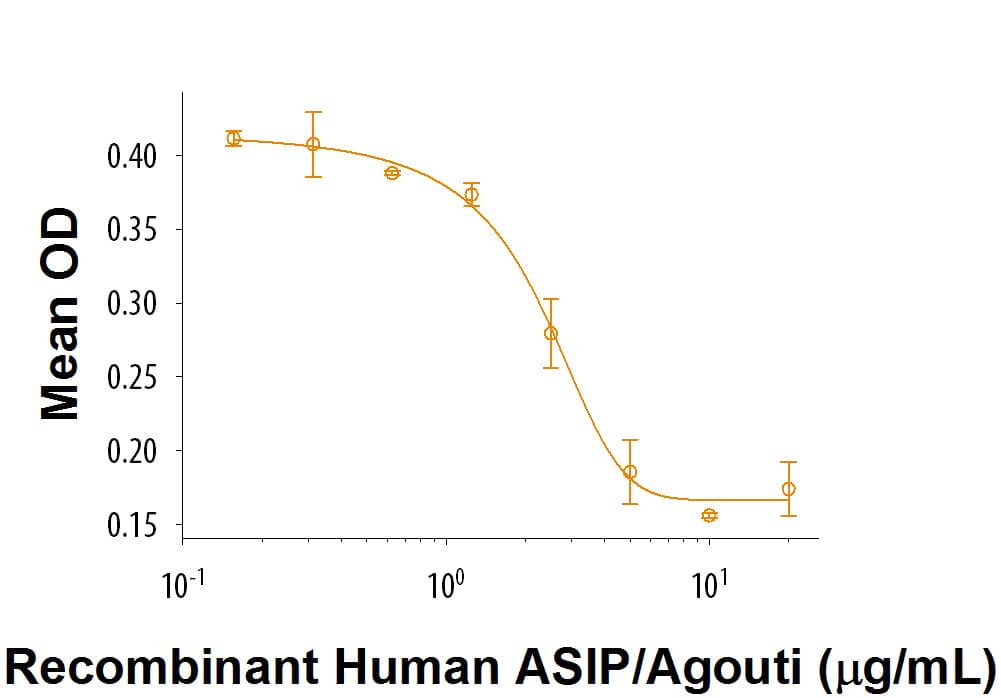Recombinant Human ASIP/Agouti Protein, CF
R&D Systems, part of Bio-Techne | Catalog # 9094-AG

Key Product Details
Product Specifications
Source
Human embryonic kidney cell, HEK293-derived human ASIP protein
His23-Cys132
His23-Cys132
Purity
>95%, by SDS-PAGE visualized with Silver Staining and quantitative densitometry by Coomassie® Blue Staining.
Endotoxin Level
<0.10 EU per 1 μg of the protein by the LAL method.
N-terminal Sequence Analysis
His23
Predicted Molecular Mass
12 kDa
SDS-PAGE
18-23 kDa, reducing conditions
Activity
Measured by its ability to inhibit alpha-MSH induced eumelanin production in B16F1 mouse melanoma cells.
The ED50 for this effect is 0.8-4 μg/mL.
The ED50 for this effect is 0.8-4 μg/mL.
Scientific Data Images for Recombinant Human ASIP/Agouti Protein, CF
Recombinant Human ASIP/Agouti Protein Bioactivity
Recombinant Human ASIP/Agouti (Catalog # 9094-AG) inhibits alpha-MSH induced eumelanin production in B16F1 mouse melanoma cells. The ED50 for this effect is 0.8-4 μg/mL.Formulation, Preparation and Storage
9094-AG
| Formulation | Lyophilized from a 0.2 μm filtered solution in PBS. |
| Reconstitution |
Reconstitute at 400 μg/mL in PBS.
|
| Shipping | The product is shipped at ambient temperature. Upon receipt, store it immediately at the temperature recommended below. |
| Stability & Storage | Use a manual defrost freezer and avoid repeated freeze-thaw cycles.
|
Background: ASIP
References
- Voisey, J. and A. van Daal (2002) Pigment Cell Res. 15:10.
- Kwon, H.Y. et al. (1994) Proc. Natl. Acad. Sci. USA 91:9760.
- Wilson, B.D. et al. (1995) Hum. Mol. Genet. 4:223.
- Mynatt, R.L. et al. (1997) Proc. Natl. Acad. Sci. USA 94:919.
- Mynatt, R.L. and J.M. Stephens (2001) Am. J. Physiol. Cell Physiol. 280:C954.
- Xue, B.Z. et al. (1999) Physiol. Genomics 1:11.
- Lu, D. et al. (1994) Nature 371:799.
- Suzuki, I. et al. (1997) J. Invest. Dermatol. 108:838.
- Kiefer, L.L. et al. (1997) Biochemistry 36:2084.
Long Name
Agouti Signaling Protein
Alternate Names
AGSW, AGTI, AGTIL, SHEP9
Gene Symbol
ASIP
UniProt
Additional ASIP Products
Product Documents for Recombinant Human ASIP/Agouti Protein, CF
Product Specific Notices for Recombinant Human ASIP/Agouti Protein, CF
For research use only
